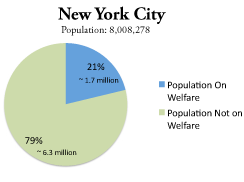Taxpayer dollars will no longer buy sodas

With 21 percent of the population of New York City on welfare, it is one of the highest cities affected by the food stamp system. 43.6 million citizens were in poverty in 2009, according to the U.S. Census Bureau.
In an effort to increase awareness and decrease waist sizes, New York mayor Michael Bloomberg recently petitioned for sugary drinks such as soda to be banned from the list of available foods for the use of food stamps in New York City.
Bloomberg made the request less than a month ago, but it is alarming that soda is still approved to buy with food stamps for the over 1.7 million people on NYC’s welfare system.
In addition to the food stamp change, Bloomberg also tried — unsuccessfully — to place a higher state tax on purchased sugar drinks.
“The city estimates food stamps pay for $75 million to $135 million worth of sugary drinks in New York each year,” according to NYDailyNews.com.
All over the nation, sugary drinks and unhealthy choices are available for purchase with food stamps. In Virginia, there is no master list of what can and cannot be purchased except for general categories.
“(Some) items that can be purchased with the Supplemental Nutrition Assistance Program (SNAP) include: food or food products meant to be eaten by people, baby formula, diabetic, or diet foods and snack foods,” according to the Virginia Department of Social Services website.
With such vague guidelines for purchasing products, novelty items could be bought with food stamps, which should not be the case, as Bloomberg is trying to create an example out of New York.
As a poor college student, spending the extra money on Fruit Roll-Ups or Pop-Tarts are snack items preciously cherished, while it is unfair that others are able to easily buy them with money from the government.
Food stamps were created to help the needy, and eating such novelty products is not included in the standard definition of needy.
Sugary-sweetened items are the largest contributor to obesity in America, both Bloomberg and Governor David Paterson said according to Bloomberg.com. While government officials are trying to ban sugary drinks from the market place in NYC, diet sodas and similar products will still be available for purchase if the initiative is passed.
Former President Bill Clinton stated that the Personal Responsibility and Work Opportunity Reconciliation Act of 1996 would end welfare as Americans know it, since welfare funding was capped or cut significantly nationwide, but serious change has yet to be seen in 2010.
Fewer people may be using food stamps, but in such economic times, people should not be able to “afford” buyingsugary drinks or other unhealthy products. The point of welfare is to steer people into jobs to provide healthier lives overall, not to allow unhealthy products to be purchased instead of nutrition.
ARMBRUSTER is the opinion editor.
